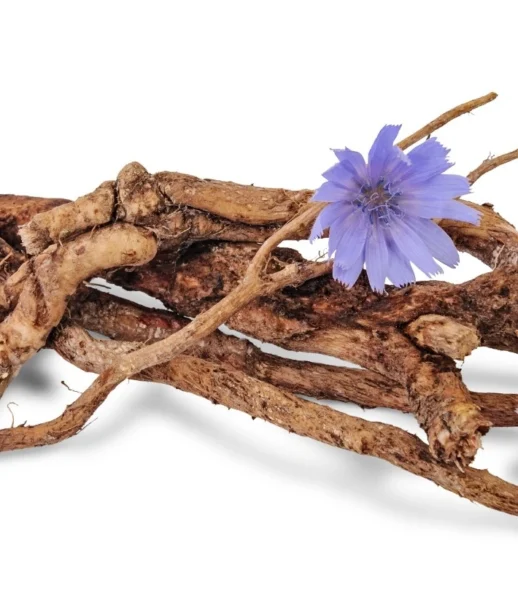Chicory is a flowering plant in the dandelion family. It is native to Europe and Asia, but it is now grown in many parts of the world. The plant has a long history of medicinal and culinary use. The most common part of the chicory plant used is the root. The root is roasted and ground into a powder, which can be used to make a beverage that resembles coffee. Chicory coffee is caffeine-free, but it has a similar flavor to coffee. It is often used as a coffee substitute, or it can be mixed with coffee to reduce the caffeine content.
The chicory root is also a good source of inulin, a type of prebiotic fiber. Inulin has been shown to have a number of health benefits, including improved gut health, weight loss, and blood sugar control.
Other parts of the chicory plant can also be used. The leaves can be eaten in salads or cooked like other greens. The flowers can be used to make a tea.
Here are some of the health benefits of chicory:
- Improves gut health: Inulin is a type of prebiotic fiber that feeds the benefi cial bacteria in the gut. This can help to improve digestion and gut health.
- Lowers blood sugar levels: Inulin has been shown to help lower blood sugar levels in people with diabetes.
- Promotes weight loss: Inulin can help to promote weight loss by increasing feelings of fullness and reducing appetite.
- Improves liver health: Chicory root extract has been shown to help protect the liver from damage.
- Boosts the immune system: Chicory root contains antioxidants that can help to boost the immune system.
Chicory is generally safe for most people. However, it is important to note that it can cause some side effects, such as gas, bloating, and belching. It is also not recommended for pregnant women or people with kidney disease.
- Biological Sources –
The biological sources of chicory are the roots, leaves, and flowers of the chicory plant. The roots are the most commonly used part of the plant, but the leaves and flowers can also be used.
Chicory root is the most common part of the plant used. It is roasted and ground into a powder, which can be used to make a beverage that resembles coffee. Chicory coffee is caffeine-free, but it has a similar flavor to coffee. It is often used as a coffee substitute, or it can be mixed with coffee to reduce the caffeine content.
Chicory leaves are edible and can be eaten in salads or cooked like other greens. They are a good source of vitamins A and C, as well as fiber. Chicory flowers can be used to make a tea. The tea is said to have a calming effect and can be helpful for digestion.
Botanical description –
- Scientific name: Cichorium intybus
- Family: Asteraceae
- Genus: Cichorium
- Species: intybus
- Common name: Chicory, blue daisy, coffeeweed, wild endive
- Life cycle: Perennial
- Height: 1-3 feet
- Leaves: Alternate, lanceolate, toothed, 3-12 inches long
- Flowers: Blue, white, or pink, 2-3 inches in diameter, in terminal clusters
- Fruit: Achenes
- Habitat: Meadows, fields, roadsides, waste areas
- Distribution: Native to Europe and Asia, introduced to North America Chicory is a tall, leafy plant with blue, white, or pink flowers. It has a long, taproot that can grow up to 3 feet long. The leaves are alternate, lanceolate, and toothed. The flowers are in terminal clusters and can be blue, white, or pink. The fruit is an achene.
Chicory is a hardy plant that can grow in a variety of conditions. It is drought tolerant and can tolerate poor soil. Chicory is a common weed in many parts of the world.
Chemical Constituents – Chicory contains a variety of chemical constituents, including:
- Inulin: A type of prebiotic fiber that feeds the beneficial bacteria in the gut.
- Sesquiterpene lactones: A group of compounds that have been shown to have anti-inflammatory and antioxidant properties.
- Coumarins: A group of compounds that have anticoagulant and anti inflammatory properties.
- Flavonoids: A group of compounds that have antioxidant and anti inflammatory properties.
- Tannins: A group of compounds that have astringent and antioxidant properties.
- Vitamins A and C: Important for vision, immune function, and skin health.
- Minerals: Including potassium, iron, and magnesium.
The exact composition of chicory can vary depending on the plant’s variety, growing conditions, and processing methods. However, the chemical constitu ents listed above are some of the most common and important ones.
Extraction Dosage –
- 450 to 500 mg

